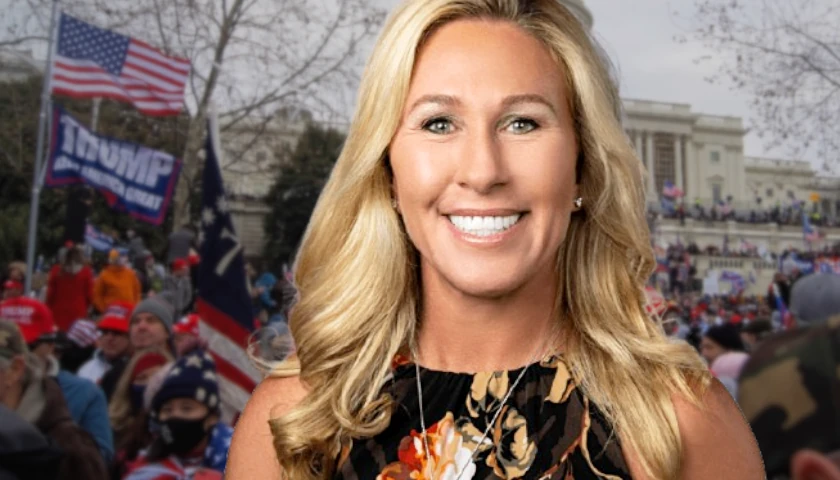The U.S. Supreme Court declined to hear an appeal from a former New Mexico county commissioner who was removed from office by a state court for his role in the January 6 protest. This left in place a lower court’s decision to remove and bar Otero County Commissioner Couy Griffin, founder of Cowboys for Trump, from office for “aid[ing] the insurrection even though he did not personally engage in violence.”
Griffin (pictured above) was convicted of a misdemeanor for trespassing on the grounds of the U.S. Capitol. Griffin never entered the Capitol building.
His attorney, Peter Ticktin, stated in court filings submitting to the Supreme Court, “If the decision … is to stand, at least in New Mexico, it is now the crime of insurrection to gather people to pray together for the United States of America on the unmarked restricted grounds of the Capitol building.” He argued that Griffin was “fundamentally exercising his Constitutional rights to free speech and assembly.”
The nation’s highest court gave no reason for the rejection.
This case was the second time the 14th Amendment’s Disqualification Clause has been used since its inception after the Civil War. It was originally drafted to deal with former members of the Confederacy after the Civil War ended. It was first applied against a socialist member of Congress, Victor Berger, who was convicted of violating the Espionage Act during World War I for opposing U.S. entry into the war. The U.S. Supreme Court overturned the conviction, allowing him to return to Congress.
Citizens for Responsibility and Ethics (CREW) brought the case against Griffin. The organization states that its priorities are racial justice, stopping voter suppression, and taking action regarding law enforcement, among other goals. Recent articles from CREW include “Trump should face fines or jail time for repeatedly violating his NY gag order,” “Granting Trump total immunity would make America a global outlier,” and “Will the Supreme Court kneecap a key law used to prosecute insurrectionists?”
The New Mexico Supreme Court previously dismissed Griffin’s appeal from the trial court’s decision on a technicality, stating that he failed to file a statement of issues within 30 days of his notice of appeal. Courts often forgive a missed filing date and allow an appellant an extension. In addition, courts are extra deferential to plaintiffs who represent themselves, pro se plaintiffs. Griffin represented himself in the disqualification lawsuit.
The trial court’s 49-page opinion removing Griffin from office was issued on September 6, 2022, by U.S. District Court Judge Francis J. Mathew, a Democrat. It said Griffin’s actions violated Section 3 of the 14th Amendment, which was added to the Constitution in 1868 to prevent Confederates from returning to government.
Section 3 states that various federal officials, as well as state legislators and state executive and judicial officers who have taken an oath pledging loyalty to the Constitution, cannot hold those positions if they “shall have engaged in insurrection or rebellion against the same, or given aid or comfort to the enemies thereof.” The clause ends, “Congress may by a vote of two-thirds of each House, remove such disability.”
Much of his opinion discussed how people at the January 6 protest had weapons and wore tactical gear. It has since been determined that many of them may have been undercover federal agents, since most of the protesters were instructed not to bring weapons or dress intimidatingly.
U.S. Representative Clay Higgins (R-LA-03) said during an interview with the Tucker Carlson Network that “there were easily 200 FBI undercover assets operating in the crowd, outside the Capitol, embedded into groups that entered the Capitol or provoked entry of the Capitol.”
“And when you track the text threads and the communications within those groups and find the origins of suggestions of potential violence or an active occupation of the Capitol on January 6th, you’ll find that those messages were led by members of the groups that ended up to be the FBI agents that had infiltrated the group,” Higgins added. According to the Associated Press, the FBI did not deny the claim.
Mathew disregarded Griffin’s testimony in defense, referring to it as “a number of January 6 conspiracy theories that he failed to substantiate with credible evidence.”
One of those was Griffin’s assertion, “I saw a guy that was dressed [as] Antifa hit a window … and I saw him immediately get stopped by what looked like a Trump supporter.”
Most of Mathew’s opinion did not discuss Griffin but repeated popular sensationalized accounts in the media about January 6.
Griffin was acquitted of a disorderly charge. He was convicted of trespassing and sentenced to 14 days time served, ordered to pay $500 restitution, pay a $3,000 fine, complete community service, and one year of supervised release. He was held in jail for 20 days after being arrested, despite the fact it was only a misdemeanor.
At the January 6 protest, Griffin climbed barricades, retaining walls, and the inaugural stage scaffolding outside the building. Griffin said in his defense that he was not aware that those areas had been designated as restricted. Using a bullhorn, he said he calmed down a group of rioters by leading them in prayer. He argued that only Congress can enforce the anti-insurrection clause of the 14th Amendment by legislation, not a state court.
Griffin is the only official removed so far, but a precedent has been set for others to be removed. This is the first time any court has ruled that January 6 was an insurrection. None of the protesters at January 6 protest have been convicted of insurrection.
In contrast, the U.S. Supreme Court ruled unanimously on March 4 that states could not use Section 3 of the 14th Amendment to remove former President Donald Trump from the ballot or office, nor other federal officials; that would need to come from Congress.
The justices held that “States have no power under the Constitution to enforce Section 3 with respect to federal offices, especially the Presidency.” However, they added this distinction, “States may disqualify persons holding or attempting to hold state office.”
CREW was behind the lawsuit in Colorado that got Trump kicked off the ballot until the SCOTUS ruling and is also going after New Mexico state legislators who were at January 6.
A petition drive attempted to oust Griffin in 2021, but he survived it. He and his fellow commissioners voted to decertify the results of the 2022 primary election in Otero County over concerns of improprieties. However, after the New Mexico Secretary of State, Maggie Toulouse Oliver, threatened them with jail time, the other two commissioners changed their votes. He is still appealing the misdemeanor conviction.
– – –
Rachel Alexander is a reporter at The Arizona Sun Times and The Star News Network. Follow Rachel on Twitter / X. Email tips to [email protected].
Photo “Couy Griffin” by Couy Griffin.








